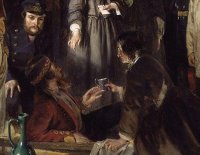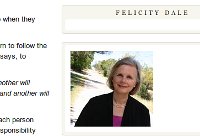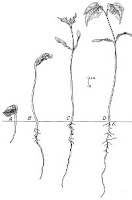I've been reading the Bible regularly or irregularly for about forty years now, and early in that process I discovered that it was useful to have a plan to follow. Having a plan makes sure that everything gets covered, and it can be used in conjunction with just dipping into favourite books and passages when I feel like it.

There are many published
Bible-reading plans and aids but none of them seemed quite right for me. So in my late twenties or early thirties I devised one of my own and I've followed it ever since. I offer it here for you to use, adapt, or ignore as you will. But even if you don't decide to use it perhaps it will encourage you to adopt another reading plan, modify your current one, or devise one of your own. You can find a
full list of the books in the Bible and the Apocrypha on the Bible Gateway website.
If you've read this far you will probably want to know how my plan works. So here it is. An explanation follows.
| Historical | Prophets | New Testament | Apochrypha | Psalms |
| | | |
| Genesis 50 | (Ezra 10) | Luke 24 | (1 Esdras 14) | 1-150 |
| Exodus 40 | Nehemiah 13 | Acts 28 | 2 Esdras 16 | Ps 151 |
| Leviticus 27 | (Esther 10) | Romans 16 | Tobit 14 | |
| Numbers 36 | Job 42 | | (Esther 10) | |
| Deuteron 34 | Proverbs 31 | Mark 16 | Judith 16 | |
| Joshua 24 | Ecclesiates 10 | 1 Corinth 16 | Wisdom 19 | |
| Judges 21 | Song of S 8 | 2 Corinth 13 | Ecclesiasticus 51 | |
| Ruth 4 | Isaiah 66 | Galatians 6 | Baruch 6 | |
| 1 Samuel 31 | Jeremiah 52 | Ephesians 6 | Susannah 1 | | |
| 2 Samuel 24 | Lamentations 5 | | Bel and dragon 1 | |
| 1 Kings 22 | Ezekiel 48 | Matthew 28 | 1 Maccabees 16 | | |
| 2 Kings 25 | Daniel 12 | Philippians 4 | 2 Maccabees 15 | |
| 1 Chronicles 29 | Hosea 14 | Colossians 4 | 3 Maccabees 7 | |
| 2 Chronicles 36 | Joel 3 | 1 Thessal 5 | 4 Maccabees 18 | |
| Amos 9 | 2 Thessal 3 | | |
| Obadiah 1 | 1 Timothy 6 | | |
| Jonah 4 | 2 Timothy 4 | | |
| Micah 7 | Titus 3 | |
| Nahum 3 | 1 Philemon 1 | | |
| Habakkuk 3 | Hebrews 13 | |
| Zephaniah 3 | | | |
| Haggai 2 | John 21 | | |
| Zechariah 14 | James 5 | | |
| Malachi 4 | 1 Peter 5 | | |
| | 2 Peter 3 | | |
| | 1 John 5 | | |
| | 2 John 1 | | |
| | 3 John 1 | | |
| | Jude 1 | | |
| | Revelation 22 | | |
| | | |
| 403 chapters | 376 chapters | 260 chapters | 204 chapters |
| 1/day=13.4 mon | 1/day=12.5 mon | 1/day=8.7 mon | 1/day=6.7 mon |
| 2/day= 6.7 mon | 2/day= 6.3 mon | 2/day=4.3 mon | 2/day=3.4 mon |
There are four columns which are designed to contain something like 300 chapters each, a fifth column contains the Psalms. The number of chapters in each book is shown after the name in each case, ie there are 50 chapters in Genesis. The idea is to read something from one column, then something from the next and so on. When you complete a column start again at its top even though you are part way through the other columns. I prefer to read more New Testament than anything else so the pattern I follow is
- Column 1 - Old Testament (historical books)
- Column 3 - New Testament
- Column 2 - Old Testament (prophets)
- Column 3 - New Testament
- Column 4 - Apocrypha
- Column 3 - New Testament
- Column 5 - Psalms
- Column 3 - New Testament
Reading this way 50% of my reading is New Testament, 25% is Old Testament (minus the Psalms), 12.5% is Psalms, and 12.5% is
Apocrypha. However, there are more verses in the Apocrypha than in Psalms, so I cover the Psalms more often than the Apocrypha. This balance suits me quite well.
The information at the bottom of the columns shows the exact number of chapters and the time it will take for the entire column reading one or two chapters daily. For example, if you read one chapter from column one every day it will take you nearly thirteen and a half months for the entire column, just over a year. At a rate of two chapters per day the column will take less than seven months.
To change the balance you can simply change the sequence of columns or the number of chapters you read each day. If you miss a few days or want to read more each day you will cover the pattern slower or faster.
Let's take a look at what's in each column and why.
Column One
This contains the Pentateuch (the first five books of the Old Testament) and the historical books. In other words it includes all the books from Genesis to 2 Chronicles. This column covers creation, the Law, and the history of Israel until they were taken into captivity by the Babylonians.
Column Two
Here you will find all the Old Testament prophetic, wisdom and poetic books (except Psalms), mostly written after the return from Babylon. There are notable exceptions - Job, for example, is a very much earlier book. Ezra and Esther are in brackets because the same chapters (and more) are included in column four. You can choose to read Ezra and Esther in both columns, or leave them out of either column two or column four.
Between them, columns one and two will take you through the entire Old Testament. If you read a chapter a day from each column you'll cover the Old Testament in just over a year.
Column Three
Unlike the Old Testament columns, I have rearranged the order of the books in column three. They are presented in four blocks with a similar number of chapters in each. There are several reasons for doing this.
The four gospels are separated so you don't read them one after another. This means you will dip into a gospel book more frequently. It also makes it possible to read Acts immediately after Luke's gospel, and as Luke wrote the two books as a consistent account to be read in sequence this seems a useful thing to do.
Arranging the books this way also brings John's gospel close to his letters and to Revelation.
Column Four
If you don't want to read the Apocrypha just leave this column out of your reading pattern and include the bracketed book of Esther in column two. But I think there are good reasons to cover the apochryphal books now and again. For one thing the books of Maccabees cover some of Israel's history between the Old and New Testaments and this is interesting in its own right.
There is no agreed order for the additional material in the Apocrypha, the Roman Catholic version is differently structured than the Anglican version, not only in terms of the books but even in terms of chapters and verses. Psalm 151 would often be included here too, but I've added it to column five instead.
Column Five
Good old Psalms! I've put them in a column of their own so that they are not read as a solid block but are interspersed in your reading. If you want to read through Psalms faster, put the column into your reading pattern more than once.
How it all works
Reading according to my choice of column pattern (1, 3, 2, 3, 4, 3, 5, 3) I began as follows.
Genesis 1, Luke 1, Ezra 1, Luke 2, 1 Esdras 1, Luke 3, Psalm 1, Luke 4 (then following the pattern again) Genesis 2, Luke 5, Ezra 2, Luke 6 and so on.
So you can see how the pattern works out. You can read just one chapter a day (or even less than a chapter) or you can read several chapters. You can break the pattern whenever you wish and come back to it. You might, for example, want to read right through a single book or part of a book for a Bible study. Simply make a note of where you are in the pattern and come back to it later.
 How are we to square this circle? Who is right?
How are we to square this circle? Who is right?

















